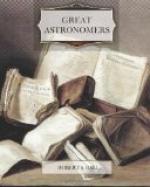It was not unusual for him to work for twelve hours at a stretch. The dawn would frequently surprise him as he looked up to snuff his candles after a night of fascinating labour at original research. Regularity in habits was impossible to a student who had prolonged fits of what he called his mathematical trances. Hours for rest and hours for meals could only be snatched in the occasional the lucid intervals between one attack of Quaternions and the next. When hungry, he would go to see whether any thing could be found on the sideboard; when thirsty, he would visit the locker, and the one blemish in the man’s personal character is that these latter visits were sometimes paid too often.
As an example of one of Hamilton’s rare diversions from the all-absorbing pursuit of Quaternions, we find that he was seized with curiosity to calculate back to the date of the Hegira, which he found on the 15th July, 622. He speaks of the satisfaction with which he ascertained subsequently that Herschel had assigned precisely the same date. Metaphysics remained also, as it had ever been, a favourite subject of Hamilton’s readings and meditations and of correspondence with his friends. He wrote a very long letter to Dr. Ingleby on the subject of his “Introduction to Metaphysics.” In it Hamilton alludes, as he has done also in other places, to a peculiarity of his own vision. It was habitual to him, by some defect in the correlation of his eyes, to see always a distinct image with each; in fact, he speaks of the remarkable effect which the use of a good stereoscope had on his sensations of vision. It was then, for the first time, that he realised how the two images which he had always seen hitherto would, under normal circumstances, be blended into one. He cites this fact as bearing on the phenomena of binocular vision, and he draws from it the inference that the necessity of binocular vision for the correct appreciation of distance is unfounded. “I am quite sure,” he says, “that I see distance with each eye separately.”
The commencement of 1865, the last year of his life saw Hamilton as diligent as ever, and corresponding with Salmon and Cayley. On April 26th he writes to a friend to say, that his health has not been good for years past, and that so much work has injured his constitution; and he adds, that it is not conducive to good spirits to find that he is accumulating another heavy bill with the printer for the publication of the “Elements.” This was, indeed, up to the day of his death, a cause for serious anxiety. It may, however, be mentioned that the whole cost, which amounted to nearly 500 pounds, was, like that of the previous volume, ultimately borne by the College. Contrary to anticipation, the enterprise, even in a pecuniary sense, cannot have been a very unprofitable one. The whole edition has long been out of print, and as much as 5 pounds has since been paid for a single copy.




